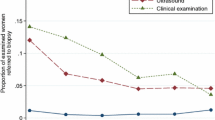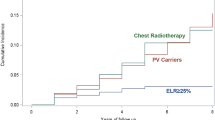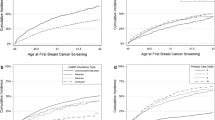Abstract
Purpose
Screening with mammography and breast magnetic resonance imaging (MRI) is an important risk management strategy for individuals with inherited pathogenic variants (PVs) in genes associated with increased breast cancer risk. We describe longitudinal screening adherence in individuals who underwent cancer genetic testing as part of usual care in a vertically integrated health system.
Methods
We determined the proportion time covered (PTC) by annual mammography and breast MRI for individuals with PVs in TP53, BRCA1, BRCA2, PALB2, NF1, CHEK2, and ATM. We determined time covered by biennial mammography beginning at age 50 years for individuals who received negative results, uncertain results, or with PVs in genes without specific breast cancer screening recommendations.
Results
One hundred and forty individuals had PVs in TP53, BRCA1, BRCA2, PALB2, NF1, CHEK2, or ATM. Among these individuals, average PTC was 48% (range 0–99%) for annual screening mammography and 34% (range 0–100%) for annual breast MRI. Average PTC was highest for individuals with PVs in CHEK2 (N = 14) and lowest for individuals with PVs in TP53 (N = 3). Average PTC for biennial mammography (N = 1,027) was 49% (0–100%).
Conclusion
Longitudinal screening adherence in individuals with PVs in breast cancer associated genes, as measured by the proportion of time covered, is low; adherence to annual breast MRI falls below that of annual mammography. Additional research should examine screening behavior in individuals with PVs in breast cancer associated genes with a goal of developing interventions to improve adherence to recommended risk management.

Similar content being viewed by others
Data Availability
Enquiries about data availability should be directed to the authors.
References
Owens DK, Davidson KW, Krist AH et al (2019) Risk assessment, genetic counseling, and genetic testing for BRCA-related cancer: US preventive services task force recommendation statement. JAMA 322(7):652–665
Genomics & Precision Health, Implementation Toolkit. https://www.cdc.gov/genomics/implementation/toolkit/tier1.htm
National Comprehensive Cancer Network (2019) NCCN clinical practice guidelines in oncology: genetic/familial high-risk assessment: breast and Ovarian. Version 3.2019–January 18, 2019. NCCN.org
Monticciolo DL, Newell MS, Moy L, Niell B, Monsees B, Sickles EA (2018) Breast cancer screening in women at higher-than-average risk: recommendations from the ACR. J Am Coll Radiol 15(3 Pt A):408–414
Lee CS, Monticciolo DL, Moy L (2020) Screening guidelines update for average-risk and high-risk women. AJR Am J Roentgenol 214(2):316–323
Warner E (2018) Screening BRCA1 and BRCA2 mutation carriers for breast cancer. Cancers (Basel) 10(12):477. 30 Nov 2018. https://doi.org/10.3390/cancers10120477
Buist DSM, Abraham L, Lee CI et al (2018) Breast biopsy intensity and findings following breast cancer screening in women with and without a personal history of breast cancer. JAMA Intern Med 178(4):458–468
Norman RP, Evans DG, Easton DF, Young KC (2007) The cost-utility of magnetic resonance imaging for breast cancer in BRCA1 mutation carriers aged 30–49. Eur J Health Econ 8(2):137–144
Grann VR, Patel PR, Jacobson JS et al (2011) Comparative effectiveness of screening and prevention strategies among BRCA1/2-affected mutation carriers. Breast Cancer Res Treat 125(3):837–847
Kriege M, Brekelmans CT, Boetes C et al (2004) Efficacy of MRI and mammography for breast-cancer screening in women with a familial or genetic predisposition. N Engl J Med 351(5):427–437
Leach MO, Boggis CR, Dixon AK et al (2005) Screening with magnetic resonance imaging and mammography of a UK population at high familial risk of breast cancer: a prospective multicentre cohort study (MARIBS). Lancet 365(9473):1769–1778
Petelin L, Hossack L, Shanahan M et al (2020) Cost-effectiveness of long-term clinical management of BRCA pathogenic variant carriers. Genet Med 22(5):831–839
Petelin L, Hossack L, Mitchell G, Liew D, Trainer AH, James PA (2019) A microsimulation model for evaluating the effectiveness of cancer risk management for BRCA pathogenic variant carriers: miBRovaCAre. Value Health 22(8):854–862
Makhnoon S, Chen M, Levin B et al (2022) Use of breast surveillance between women with pathogenic variants and variants of uncertain significance in breast cancer susceptibility genes. Cancer 128(20):3709–3717
Ter-Minassian M, Schaeffer ML, Jefferson CR, Shapiro SC, Suwannarat P, Visvanathan K (2021) Screening and preventative strategies for patients at high risk for breast cancer. JCO Oncol Pract 17(4):e575–e581
Vetter L, Keller M, Bruckner T et al (2016) Adherence to the breast cancer surveillance program for women at risk for familial breast and ovarian cancer versus overscreening: a monocenter study in Germany. Breast Cancer Res Treat 156(2):289–299
Wernli KJ, Callaway KA, Henderson LM et al (2020) Trends in screening breast magnetic resonance imaging use among US women, 2006 to 2016. Cancer 126(24):5293–5302
Garcia C, Wendt J, Lyon L et al (2014) Risk management options elected by women after testing positive for a BRCA mutation. Gynecol Oncol 132(2):428–433
Makhnoon S, Maki KG, Yu R, Peterson SK, Shete S (2022) Are beliefs about the importance of genetics for cancer prevention and early detection associated with high risk cancer genetic testing in the U.S. Population? Prev Med Rep 27:101781
Chubak J, Anderson ML, Cook AJ, Murphy CC, Jackson ML, Green BB (2020) Methodologic considerations in calculating and analyzing proportion of time covered as a measure of longitudinal cancer screening adherence. Cancer Epidemiol Biomarkers Prev 29(8):1549–1556
Chubak J, Ziebell R, Greenlee RT et al (2016) The Cancer Research Network: a platform for epidemiologic and health services research on cancer prevention, care, and outcomes in large, stable populations. Cancer Causes Control 27(11):1315–1323
Sengupta S, Bachman D, Laws R et al (2019) Data quality assessment and multi-organizational reporting: tools to enhance network knowledge. EGEMS (Wash DC) 7(1):8
NCQA. Breast Cancer Screening (BCS, BCS-E). https://www.ncqa.org/hedis/measures/breast-cancer-screening
Gregory-Mercado KY, Will J, True S et al (2007) A combined approach to women’s health is associated with a greater likelihood of repeat mammography in a population of financially disadvantaged women. Prev Chronic Dis 4(4):A89
Song L, Fletcher R (1998) Breast cancer rescreening in low-income women. Am J Prev Med 15(2):128–133
Evans JL, Nasca PC, Baptiste MS et al (1998) Factors associated with repeat mammography in a New York State public health screening program. J Public Health Manag Pract 4(5):63–71
Bobo JK, Shapiro JA, Schulman J, Wolters CL (2004) On-schedule mammography rescreening in the National Breast and Cervical Cancer Early Detection Program. Cancer Epidemiol Biomarkers Prev 13(4):620–630
Berg WA, Blume JD, Adams AM et al (2010) Reasons women at elevated risk of breast cancer refuse breast MR imaging screening: ACRIN 6666. Radiology 254(1):79–87
Pan IW, Oeffinger KC, Shih YT (2022) Cost-sharing and out-of-pocket cost for women who received MRI for breast cancer screening. J Natl Cancer Inst 114(2):254–262
Chichura A, Hunt J, Lang J, Pederson H (2022) Lapses in breast cancer screening for highly penetrant mutation carriers during pregnancy and lactation. J Surg Oncol 125(4):589–595
Mittendorf KF, Knerr S, Kauffman TL, et al (2021) Systemic barriers to risk-reducing interventions for hereditary cancer syndromes: implications for health care inequities. JCO Precis Oncol 5
Pichert G, Jacobs C, Jacobs I et al (2010) Novel one-stop multidisciplinary follow-up clinic significantly improves cancer risk management in BRCA1/2 carriers. Fam Cancer 9(3):313–319
Laws A, Mulvey TM (2021) Implementation of a high-risk breast clinic for comprehensive care of women with elevated breast cancer risk identified by risk assessment models in the community. JCO Oncol Pract 17(2):e217–e225
Ricker C, Lagos V, Feldman N et al (2006) If we build it … will they come?–establishing a cancer genetics services clinic for an underserved predominantly Latina cohort. J Genet Couns 15(6):505–514
Cohen SA, Scherr CL, Nixon DM (2018) An iPhone application intervention to promote surveillance among women with a BRCA mutation: pre-intervention data. J Genet Couns 27(2):446–456
Makhnoon S, Bednar EM, Krause KJ, Peterson SK, Lopez-Olivo MA (2021) Clinical management among individuals with variant of uncertain significance in hereditary cancer: a systematic review and meta-analysis. Clin Genet 100(2):119–131
Lowry KP, Geuzinge HA, Stout NK et al (2022) breast cancer screening strategies for women with ATM, CHEK2, and PALB2 pathogenic variants: a comparative modeling analysis. JAMA Oncol 8(4):587–596
Acknowledgements
This work was supported by the Clinical Sequencing Evidence-Generating Research (CSER) consortium funded by the National Human Genome Research Institute with co-funding from the National Institute on Minority Health and Health Disparities (NIMHD) and the National Cancer Institute (NCI). The CSER consortium represents a diverse collection of projects investigating the application of genome-scale sequencing in different clinical settings including pediatric and adult subspecialties, germline diagnostic testing and tumor sequencing, and specialty and primary care.
Funding
This work was primarily supported by the National Institutes of Health: U01HG007292 (MPIs: Wilfond, Goddard), U24HG007307 (PI: G. Jarvik); K08HG010488 (PI: S. Knerr).
Author information
Authors and Affiliations
Contributions
Conceptualization: SK, BG, KJW, KFM, BD, KABG; Data curation: BG, MJG, EK, JMZ; Formal analysis: SK, BG; Funding acquisition: SK, KJW, GJ, SO, DLV, BSW, KABG, TLK; Project administration: TLK, KRM. Supervision: KJW, KABG, Writing-original draft SK, B.G., KJW, KFM, BD, KABG; Writing-reviewing & editing: SK, BG, KJW, KFM, HSF, MJG, GPJ, TLK, EK, EGL, FLL, KRM, SO, DLV, JMV, BSW, BD, KABG.
Corresponding author
Ethics declarations
Conflict of interest
The authors have no conflicts of interest outside the grant funding listed in the funding section.
Ethical approval
The study was approved by the Kaiser Permanente Northwest Institutional Review Board with a waiver of informed consent.
Additional information
Publisher's Note
Springer Nature remains neutral with regard to jurisdictional claims in published maps and institutional affiliations.
Rights and permissions
Springer Nature or its licensor (e.g. a society or other partner) holds exclusive rights to this article under a publishing agreement with the author(s) or other rightsholder(s); author self-archiving of the accepted manuscript version of this article is solely governed by the terms of such publishing agreement and applicable law.
About this article
Cite this article
Knerr, S., Guo, B., Wernli, K.J. et al. Longitudinal adherence to breast cancer surveillance following cancer genetic testing in an integrated health care system. Breast Cancer Res Treat 201, 461–470 (2023). https://doi.org/10.1007/s10549-023-07007-w
Received:
Accepted:
Published:
Issue Date:
DOI: https://doi.org/10.1007/s10549-023-07007-w




